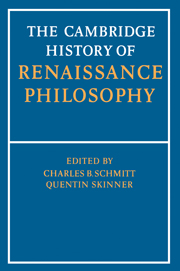Book contents
- Frontmatter
- Introduction
- PART 1 THE INTELLECTUAL CONTEXT
- PART 2 PHILOSOPHY AND ITS PARTS
- 6 Logic and language: Traditional logic
- 7 Logic and language: Humanistic logic
- 8 Natural philosophy: Traditional natural philosophy
- 9 Natural philosophy: The new Philosophy of nature
- 10 Natural philosophy: Astrology and magic
- 11 Moral philosophy
- 12 Political philosophy
- 13 Psychology: The concept of psychology
- 14 Psychology: The organic soul
- 15 Psychology: The intellective soul
- 16 Metaphysics
- 17 Problems of knowledge and action: Fate, fortune, providence and human freedom
- 18 Problems of knowledge and action: Theories of knowledge
- 19 Problems of knowledge and action: Epistemology of the sciences
- 20 Philosophy and humanistic disciplines: Rhetoric and poetics
- 21 Philosophy and humanistic disciplines: The theory of history
- PART 3 SUPPLEMENTARY MATERIAL
- Biobibliographies
- Bibliography
- Index nominun
- Index rerum
- References
7 - Logic and language: Humanistic logic
from PART 2 - PHILOSOPHY AND ITS PARTS
Published online by Cambridge University Press: 28 March 2008
- Frontmatter
- Introduction
- PART 1 THE INTELLECTUAL CONTEXT
- PART 2 PHILOSOPHY AND ITS PARTS
- 6 Logic and language: Traditional logic
- 7 Logic and language: Humanistic logic
- 8 Natural philosophy: Traditional natural philosophy
- 9 Natural philosophy: The new Philosophy of nature
- 10 Natural philosophy: Astrology and magic
- 11 Moral philosophy
- 12 Political philosophy
- 13 Psychology: The concept of psychology
- 14 Psychology: The organic soul
- 15 Psychology: The intellective soul
- 16 Metaphysics
- 17 Problems of knowledge and action: Fate, fortune, providence and human freedom
- 18 Problems of knowledge and action: Theories of knowledge
- 19 Problems of knowledge and action: Epistemology of the sciences
- 20 Philosophy and humanistic disciplines: Rhetoric and poetics
- 21 Philosophy and humanistic disciplines: The theory of history
- PART 3 SUPPLEMENTARY MATERIAL
- Biobibliographies
- Bibliography
- Index nominun
- Index rerum
- References
Summary
LOGIC: CRITICISMS BY HUMANISTS
Introduction
Humanism encountered Aristotelian logic as a central component in the scholastic curriculum, a curriculum which it was humanists' ambition to replace with one more appropriate to a ‘classical’ education. Because it was from their position as teachers of the liberal arts that humanists challenged traditional treatments of logic, their interventions in the field have tended to be characterised as crucially disruptive and destructive, and they have been blamed for producing a hiatus in the development of formal logic from which the discipline has barely recovered. Although recent scholarly work has established humanist dialectic as an area of energetic intellectual activity, the secondary literature continues to give credence to the view that the activity was fragmented and eclectic, and continues to assume a fundamental lack of relevance of developments associated with humanist dialectic to the development of logic proper.
This is, however, to underestimate the importance of Renaissance developments in logic, both in the context of specifically humanist interventions and, perhaps even more importantly, in the light of cross-influence and interaction between humanist and scholastic scholarly contributions. In spite of scholastic logicians' insistence on the formal nature of their concern with ratiocination (as opposed to the more ‘linguistic’ interest of terminists and moderni), technical exploration of argument forms was inevitably conducted with at least sidelong glances at other available approaches. Furthermore, separate specialist discussions do not remain neatly cut off from one another in the context of the curriculum and the textbook. Thus (to take a single example) the Aristotelian Agostino Nifo chooses to react to the humanist Lorenzo Valla's reformulated dialectic in his Dialectica ludicra (‘Schoolroom dialectic/Playful dialectic’), rather than to dismiss it out of hand.
- Type
- Chapter
- Information
- The Cambridge History of Renaissance Philosophy , pp. 173 - 198Publisher: Cambridge University PressPrint publication year: 1988
References
- 22
- Cited by



